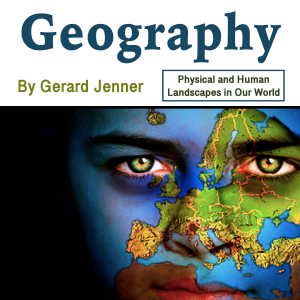

Geography
Gerard Jenner
This audiobook is narrated by a digital voice.
The satellite image on Dr. Sarah Chen's computer screen revealed the sprawling megacity of Lagos, Nigeria, its urban fabric spreading across what had been mangrove swamps and coastal forests just decades earlier, while red dots marking slum settlements clustered along transportation corridors and industrial zones. As an urban geographer studying rapid urbanization in West Africa, Chen understood that this single image contained layers of geographic meaning including population growth, economic development, environmental change, and social inequality that could only be understood through the spatial thinking that defines geographic inquiry.
Geography represents more than the memorization of place names and capital cities that many people remember from their school experience; it encompasses a distinctive way of thinking about the world that emphasizes the importance of location, spatial relationships, and the interactions between human societies and their environments. Geographic thinking involves asking where things are located, why they are located where they are, how locations influence what happens there, and how places are connected to each other across space and time.
The concept of place lies at the heart of geographic inquiry, representing more than simple location on a map but encompassing the physical characteristics, human activities, and cultural meanings that give locations their distinctive identities. Places are created through the interaction of natural processes and human activities over time, resulting in unique combinations of environmental conditions, built environments, and cultural landscapes that influence how people live while being constantly modified by human action and natural change.
Duration - 49m.
Author - Gerard Jenner.
Narrator - Digital Voice Matt G.
Published Date - Monday, 20 January 2025.
Copyright - © 2025 Gerard Jenner ©.
Location:
United States
Networks:
Gerard Jenner
Digital Voice Matt G
Freegulls Publishing House LLC
English Audiobooks
Findaway Audiobooks
Description:
This audiobook is narrated by a digital voice. The satellite image on Dr. Sarah Chen's computer screen revealed the sprawling megacity of Lagos, Nigeria, its urban fabric spreading across what had been mangrove swamps and coastal forests just decades earlier, while red dots marking slum settlements clustered along transportation corridors and industrial zones. As an urban geographer studying rapid urbanization in West Africa, Chen understood that this single image contained layers of geographic meaning including population growth, economic development, environmental change, and social inequality that could only be understood through the spatial thinking that defines geographic inquiry. Geography represents more than the memorization of place names and capital cities that many people remember from their school experience; it encompasses a distinctive way of thinking about the world that emphasizes the importance of location, spatial relationships, and the interactions between human societies and their environments. Geographic thinking involves asking where things are located, why they are located where they are, how locations influence what happens there, and how places are connected to each other across space and time. The concept of place lies at the heart of geographic inquiry, representing more than simple location on a map but encompassing the physical characteristics, human activities, and cultural meanings that give locations their distinctive identities. Places are created through the interaction of natural processes and human activities over time, resulting in unique combinations of environmental conditions, built environments, and cultural landscapes that influence how people live while being constantly modified by human action and natural change. Duration - 49m. Author - Gerard Jenner. Narrator - Digital Voice Matt G. Published Date - Monday, 20 January 2025. Copyright - © 2025 Gerard Jenner ©.
Language:
English
Geography
Duration:00:49:46